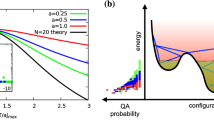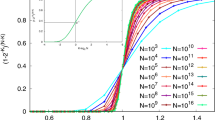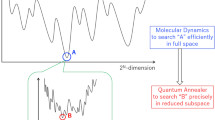Abstract
OPTIMIZATION problems are common to many diverse disciplines. The classic example is the travelling-salesman problem1,2, in which the objective is to find the shortest path connecting a number of cities. Spin glasses3, meanwhile, exemplify a general class of systems subject to conflicting constraints: in this case, the impossibility of each spin in a lattice aligning favourably with all of its neighbours leads to 'frustration' and to a large number of local energy minima. The optimization problem then becomes the attempt to find the global minimum, or ground state. Predicting the conformational ground state of proteins4 is closely allied to the spin-glass problem. The chief difficulty in searching for global minima is that straightforward search algorithms1 tend to become trapped in local minima. Only a few promising approaches, such as simulated annealing2 or genetic algorithms5, exist. Here I present a general purpose Monte Carlo procedure in which local redirections of the search path are effected at all relevant length scales while enforcing a one-dimensional random walk in the function being minimized. This method yields a series of extrema, from which the global minimum can be extracted with high probability in the limit of large statistics.
This is a preview of subscription content, access via your institution
Access options
Subscribe to this journal
Receive 51 print issues and online access
$199.00 per year
only $3.90 per issue
Buy this article
- Purchase on Springer Link
- Instant access to full article PDF
Prices may be subject to local taxes which are calculated during checkout
Similar content being viewed by others
References
Press, H. W., Flannery, B. P., Teukolsky, S. A. & Vetterling, W. T. Numerical Recipes (Cambridge Univ. Press, 1988).
Kirkpatrick, S., Gelatt, C. D. & Vecchi, M. P. Science 220, 671–680 (1983).
Fisher, K. H. & Hertz, J. A. Spin Glasses (Cambridge Univ. Press, 1991).
Frauenfelder, H., Chu, K. & Philip, R. in Biologically Inspired Physics, NATO ASI Series B263, 1–14 (Plenum, New York, 1991).
Holland, J. H. Scient. Am. 44–50 (July 1992).
Metropolis, N., Rosenbluth, A., Rosenbluth, M., Teller, A. & Teller, E. J. chem. Phys. 21, 1087–1092 (1953).
Berg, B. & Neuhaus, T. Phys. Lett. B267, 249–253 (1991).
Berg, B. Int. J. mod. Phys. C3, 1083–1096 (1992).
Torrie, G. M. & Valleau, J. P. J. comput. Phys. 23, 187–199 (1977).
Berg, B. & Celik, T. Phys. Rev. Lett. 69, 2292–2295 (1992).
Marinari, E. & Parisi, G. Europhys. Lett. 19, 451–458 (1992).
Okamoto, Y., Kikuchi, T. & Kawai, H. Chem. Lett. 1992, 1275–1278.
Nayem, A., Vila, J. & Scheraga, H. A. J. comput. Chem. 12, 594–609 (1991).
Author information
Authors and Affiliations
Rights and permissions
About this article
Cite this article
Berg, B. Locating global minima in optimization problems by a random-cost approach. Nature 361, 708–710 (1993). https://doi.org/10.1038/361708a0
Received:
Accepted:
Issue Date:
DOI: https://doi.org/10.1038/361708a0
This article is cited by
-
An improved method of joint inversion using GPS and gravity observation data
Geo-spatial Information Science (2005)
Comments
By submitting a comment you agree to abide by our Terms and Community Guidelines. If you find something abusive or that does not comply with our terms or guidelines please flag it as inappropriate.



